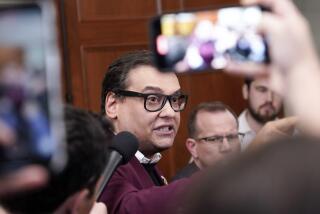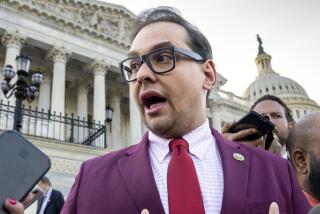Waters must wait
Rep. Maxine Waters, the South Los Angeles Democrat who faces serious ethics charges, engaged in some political theater Monday, showing up outside the hearing room on the day her trial before the House Ethics Committee was supposed to have begun. Complaining about an indefinite postponement of the proceedings, Waters said: “I have been denied basic due process.”
We wouldn’t go that far, but we sympathize with Waters’ frustration. It has been a year and a half since the Office of Congressional Ethics sent a report to the Ethics Committee about the congresswoman, who is accused of improperly intervening with the Treasury Department on behalf of a bank with ties to her husband. It has been six months since an investigative subcommittee of the Ethics Committee filed its “statement of alleged violation.” Yet the eight-member committee that will try her has yet to begin work. Indeed, the Waters case has been returned to the investigative subcommittee.
The problem is that the committee recently obtained a 2008 e-mail about bank bailouts that Waters’ chief of staff sent to the House Financial Services Committee. The Ethics Committee was right to postpone the trial until its investigators could assess the importance of this communication, but it should make the delay as short as possible.
The charges against Waters are significant. The investigative subcommittee has found that there is substantial reason to believe she violated the Code of Ethics for Government Service, as well as a requirement that members “behave at all times in a manner that shall reflect creditably on the House.” She also is accused of violating the “spirit” of a rule against receiving compensation for improper official acts.
Central to the case against her is a meeting she arranged in 2008 between Treasury Department officials and the National Bankers Assn., which represents minority-owned banks. The only bank with representatives at the meeting was OneUnited Bank, on whose board Waters’ husband had served and in which he owned stock. Subsequently, OneUnited received $12 million as part of a government bailout.
Waters denies wrongdoing, insisting that her concern was for minority-owned banks in general and denying that she personally benefited from the contacts she set in motion. Even her detractors should withhold final judgment until after her defense.
Waters is eager to offer that defense and suggests that the postponement of the trial “demonstrates in no uncertain terms the weakness of their case against me.” We’d prefer to believe that the committee wants to make sure the proceedings are as thorough as possible. In this case, justice delayed is not justice denied — yet.
More to Read
Get the L.A. Times Politics newsletter
Deeply reported insights into legislation, politics and policy from Sacramento, Washington and beyond. In your inbox three times per week.
You may occasionally receive promotional content from the Los Angeles Times.










